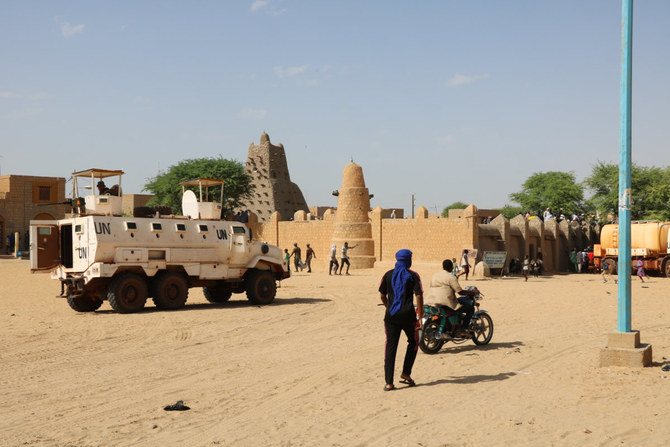UNITED NATIONS: Mali’s military junta succeeded in kicking out the UN peacekeeping force, and on Wednesday its Russian allies scored yet another victory against the UN: They were able to terminate all UN sanctions on Malians and abolish a panel of experts which has been critical of activities of Russia’s Wagner Group in the West African nation.
The travel ban and asset freeze, currently affecting eight Malians on the UN blacklist for threatening peace efforts, and the mandate of the panel of experts monitoring the implementation of sanctions were up for renewal in the UN Security Council.
A French and United Arab Emirates-drafted resolution that would have extended the sanctions regime until Aug. 31, 2024 and the mandate of the UN panel of experts monitoring sanctions until Sept. 30, 2024 was put to a vote first. It got 13 “yes” votes in the 15-member council but was vetoed by Russia. China abstained.
A rival Russian resolution that would have extended sanctions “for the final period of 12 months” until Aug. 31, 2024 and abolished the panel of experts “with immediate effect” failed to get the minimum nine “yes” votes needed for adoption. In the vote, Russia was the only country to vote in favor, Japan voted against, and 13 countries abstained.
The result is that after Thursday, Aug. 31, when the current sanctions regime ends there will be no sanctions on the Malians. The panel of experts submitted their last report which was circulated last week and its mandate will officially end on Sept. 30.
Russia’s UN Ambassador Vassily Nebenzia told council members before the vote that it would not allow another resolution to be put forward on sanctions and the panel of experts.
Nebenzia called for consultations before the votes, which the US agreed to after a long break, but Russia’s demands on sanctions and the experts were not acceptable to supporters of the France-UAE resolution, so the voting went ahead. Nebenzia said after casting the veto on that resolution that its views and those of the Mali rulers were not taken into consideration.
US deputy ambassador Robert Wood, who chaired the meeting, called sanctions “necessary to stem the illicit financial transfers and ill-gotten gains both from Mali and into a region in which numerous malign actors operate and have sadly proliferated.”
He called the panel of experts’ reporting “a central source of information on the situation in Mali,” and said Russia wanted to eliminate its mandate “to stifle publication of uncomfortable truths about Wagner’s actions in Mali, which require attention.” He said Russia’s draft was “lamentably short” on providing sustained support for Mali.
France’s deputy UN ambassador Nathalie Broadhurst expressed deep regret at Russia’s veto at a crucial time for Mali and the region. “The choice made by Russia follows the participation of Wagner mercenaries in fighting” in northern Ber, where the UN was evacuating a peacekeeping base, and in airstrikes that “imperil” a cease-fire and a 2015 peace agreement, she noted.
In their final report to the council, the panel of experts said they remain particularly concerned with persistent conflict-related sexual violence in Mali’s eastern Menaka and central Mopti regions, “especially those involving the foreign security partners of the Malian Armed Force” – the Wagner Group.
“The panel believes that violence against women, and other forms of grave abuses of human rights and international humanitarian law are being used, specifically by the foreign security partners, to spread terror among populations,” the report said.
The experts also said Daesh extremists have almost doubled the territory they control in Mali in less than a year, and their Al-Qaeda-linked rivals are capitalizing on the deadlock and perceived weakness of armed groups that signed a 2015 peace agreement.
The stalled implementation of the peace deal and sustained attacks on communities have offered the Daesh group and Al-Qaeda affiliates a chance “to re-enact the 2012 scenario,” they said.
That’s the year when a military coup took place in the West African country and rebels in the north formed an Islamic state two months later.
The extremist rebels were forced from power in the north with the help of a French-led military operation, but they moved from the arid north to more populated central Mali in 2015 and remain active.
In August 2020, Mali’s president was overthrown in a coup that included an army colonel who carried out a second coup and was sworn in as president in June 2021. He developed ties to Russia’s military and the Wagner group whose head, Yevgeny Prigozhin, was reportedly killed in a plane crash on a flight from Moscow last week.
In June, Mali’s junta ordered the nearly 15,000-strong UN peacekeeping force to leave after a decade of working on stemming the jihadi insurgency The Security Council terminated the mission’s mandate on June 30 and the UN is in the throes of what Secretary-General António Guterres calls an “unprecedented” six-month exit from Mali.
The UN special envoy for Mali, El-Ghassim Wane, laid out the scale of the operation to the council on Monday: All 12,947 UN peacekeepers and police must be sent home, their 12 camps and one temporary base handed over to the government, and 1,786 civilian staff terminated by the Dec. 31 deadline.
















